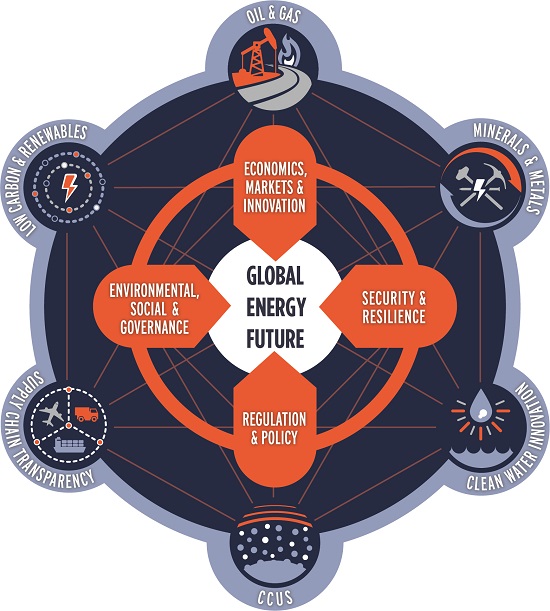Global Energy Future Initiative
Connecting energy innovators,
industry leaders and policy makers
to advance scientific, data-driven solutions
for the global energy future
The Future of Energy is Now, at Mines
Join the Mines Global Energy Future Initiative as we bring together global energy thought leaders and world-class Colorado School of Mines faculty through research, education, workshops, seminars and outreach.

Why Mines Global Energy Future Initiative?
Governments and industry around the globe are pursuing increasingly ambitious initiatives to reduce greenhouse gas emissions and diversify their energy portfolios, all while the world is facing significant growth in energy demand from emerging and developing economies. On these complex issues, Mines has a unique combination of expertise with the depth to meet the energy challenges head on. Mines has an exceptional track record of solving tough scientific and engineering problems across the gamut of energy and environmental fields. The university enjoys a hard-earned reputation as an unbiased problem-solver in disciplines often at odds in the energy-environment discussion; the university tagline, “Earth, Energy, Environment” is an accurate reflection of our expansive and growing purview.
With partners from academia, industry, government, and civil society galvanized by Mines’ uniquely comprehensive expertise, we’re developing energy solutions that will shape decision-making, now and in the decades to come.
Impactful Hubs

Low Carbon and Renewable Energy
Developing renewable, secure, resilient, and adaptive energy infrastructure that fosters economic growth while reducing environmental impact
Carbon Capture Utilization & Storage (CCUS)
Multidisciplinary approach to scientific, engineering and policy research on net zero emissions technological innovations
Clean Water Innovations
Role of technology innovation in reimagining global water in the future energy system
Minerals & Metals
Finding solutions to meet the minerals and metals needs to create our future energy system, including sustainable mining practices; technological innovations in mining; and the role of markets, economics and policy
Oil and Gas
Designing interdisciplinary research focused on the science, engineering and policy of oil and gas in the net-zero energy future
Supply Chain Transparency
Understanding how the future energy system will impact the global supply chain and the associated effects on markets, communities and the environment
Upcoming Events
Global Energy Leaders Summit
September 26 and 27, 2024
Join us as we bring together global energy thought leaders, decision makers, and world-class Colorado School of Mines faculty, alumni, and students for the inaugural Global Energy Leaders Summit. As a leading research institution, Colorado School of Mines welcomes attendees to the heart of the evolving energy landscape on Thursday and Friday, September 26 and 27, 2024.
Latest News
Monitoring China’s Mineral Stockpiling and Understanding Its Military Implications 7/26/2024
Monitoring China’s Mineral Stockpiling and Understanding Its Military Implications
Payne Institute Communication Associate Gregory Wischer and Director Morgan Bazilian co-author an article about discerning when China is stockpiling – and why – is increasingly challenging given China’s increasing secrecy about mineral-related information. Concerns continue apace about the meaning of China stockpiling minerals. In addition to China’s government statements and military activities, stockpiling minerals is one potential indicator that China may be preparing for a military invasion of Taiwan. 7/26/2024.
A Systems Engineering Approach to Decarbonizing Mining: Analyzing Electrification and CO2 Emission Reduction Scenarios for Copper Mining Haulage Systems 7/25/2024
A Systems Engineering Approach to Decarbonizing Mining: Analyzing Electrification and CO2 Emission Reduction Scenarios for Copper Mining Haulage Systems
Payne Institute Faculty Fellow Dr. H. Sebnem Düzgün, student researcher Kemalcan Aydogdu and Evren Deniz Yaylaci and Fatih Aranoglu write that due to climate change risks, the public, regulators, and investors require solid actions to minimize the greenhouse gas (GHG) emissions of mineral extraction and metals production. The mining sector considers alternatives to reduce its carbon footprint by transforming the business and adopting new technologies into operations. Given the capital intensity, technical characteristics, and business structure involved, a shift in the mining industry necessitates impartial insights into the trade-offs and risks. 7/25/2024.
Harris expected to campaign on Biden administration’s energy, climate record 7/22/2024
Harris expected to campaign on Biden administration’s energy, climate record
Payne Institute Director Morgan Bazilian contributes to this article about how Vice President Kamala Harris will inherit the Biden administration’s record on energy and climate policy as she looks to secure the Democratic Party’s presidential nomination and deny former US President Donald Trump a second term in November. July 22, 2024.
Financial Risk Management for Geological Storage 7/22/24
Financial Risk Management for Geological Storage
Payne Institute Program Manager Brad Handler, Lindene E. Patton, student researchers Siddhant Kulkarni and Felix Ayaburi, and Darshil Shah write the third paper in a series of papers on the use of Carbon Capture and Storage (CCS) as a climate mitigation tool envisions the permanent underground storage of CO2. The U.S. government has implemented several policies designed to position Carbon Capture and Storage (CCS) projects for growth. These include a regulatory framework and financial incentives such as Internal Revenue Service Section 45Q tax credits and grants. July 22,2024.
RADIOACTIVE 7/17/2024
Radioactive
Payne Institute Faculty Fellow Ian Lange contributes to this article about how Energy Fuels Inc., a Denver company, is seeking to mine uranium near the Grand Canyon — and an Indigenous tribe’s long fight to stop it. Prices for uranium rose enough for the company to seek to bring uranium ore to White Mesa from one of the company’s mothballed uranium mine sites. July 17, 2024.
Why Mines?
Since 1874, Mines has been a pioneer at the frontiers of science and engineering, from locating and recovering earth resources, to energy production, to environmental stewardship.
Over time, Mines’ expertise expanded to meet the changing needs of industry and society, playing key roles in the growth of the global energy and natural resource industries. We are now positioned to leverage that deep expertise through a data-driven approach to informing the global energy future, in collaboration with academia, industry, government and civil society partners.
Leadership
John Bradford
Vice President for Global Initiatives
Morgan Bazilian
Director, Payne Institute for Public Policy
For more information about the Mines Global Energy Future Initiative at the Colorado School of Mines, please contact our Deputy Director, Gregory Clough, at gclough@mines.edu.
Mines@150
As Colorado School of Mines approaches our sesquicentennial, we are ideally suited to lead this initiative. Our bold and ambitious MINES@150 strategic plan builds on the exceptional legacy of our PAST, the ways we impact the PRESENT and the POSSIBILITIES of our global energy future.













